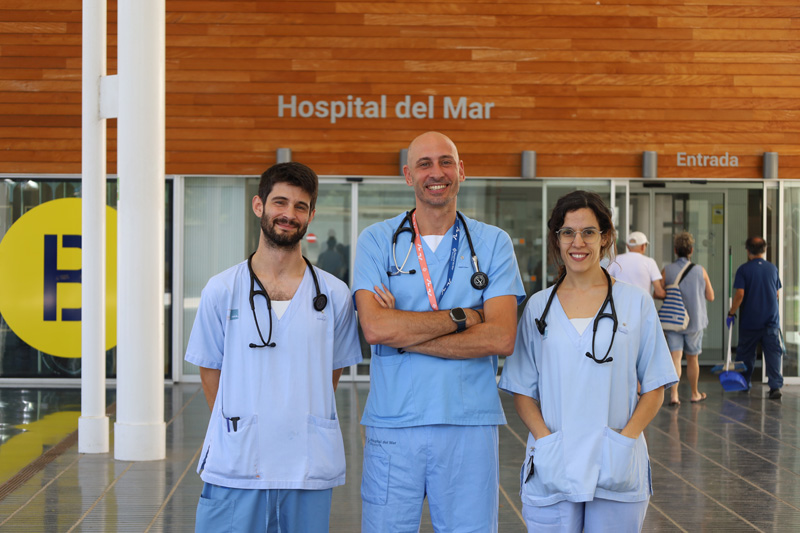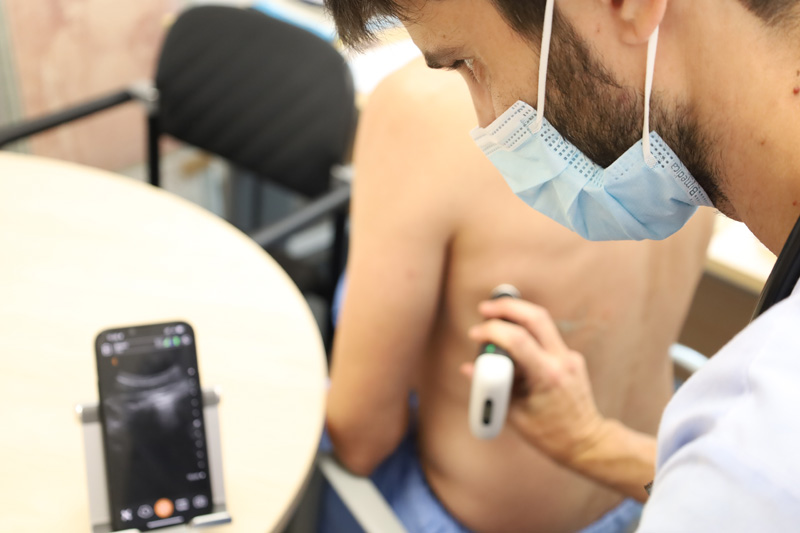
23/07/2024 - Press release
A team of doctors from Hospital del Mar, Doctors Without Borders (MSF), and Epicentre, MSF's division dedicated to epidemiology and medical research, has published a study validating the usefulness of chest ultrasound in identifying which patients may have a worse prognosis due to COVID-19 pneumonia. The study, published in the Journal of Clinical Medicine, establishes a useful scale to discern which patients are at higher risk of developing severe complications from SARS-CoV-2 infection, potentially requiring intensive care unit (ICU) admission and/or invasive ventilation.

From left to right, Sergi Rodríguez, Robert Güerri, Lucía Suaya
The study was conducted during the early waves of the pandemic, from August 2020 to April 2021. Over 600 ultrasounds were performed on a group of 248 patients hospitalized with COVID-19 at Hospital del Mar to assess whether this technique was useful in predicting their prognosis. The test involved evaluating the condition of the lungs at twelve different points and assigning a score based on the obtained images.
Of the 248 evaluated patients, with an average age of 60, two out of three were men, 13 died, and 36 patients required ICU admission. The average length of stay for those who survived was 8.5 days.
Four times higher risk for those with higher scores
The study established that patients with a score of 17 points or higher, out of a possible 36, on the chest ultrasound had up to four times higher risk of a negative prognosis. This negative prognosis could lead to ICU admission or the need for invasive ventilation. In some cases, it could even result in the patient's death. In such cases, early intervention, including oxygen therapy, would be necessary. Conversely, the study found that patients with a score below seven points could be classified as having a non-severe illness and manage the infection with standard treatment.

Regarding these conclusions, Dr. Robert Güerri, head of the Infectious Diseases Service at Hospital del Mar, researcher at its research institute, and one of the study's authors, highlights that "during the first wave of COVID-19, this study was conducted to evaluate the diagnostic and prognostic utility of lung ultrasound in monitoring COVID-19 patients. This study allowed many professionals, especially resident doctors, to become familiar with the use of ultrasound, discovering its versatility and clinical utility." The work, in which resident doctors completing their training at Hospital del Mar played a crucial role, also notes that repeating the test 72 hours after the patient's admission does not improve its prognostic capacity.
The study confirms the usefulness of this diagnostic test in COVID-19 and points to its potential use in other viral diseases with pulmonary involvement. "Since 2018, MSF has had a training and implementation plan for portable ultrasound to train healthcare personnel in the projects and improve patient care," says Cristian Casademont, MSF's medical director. "It is a quick and effective diagnostic tool with the potential to substantially improve care quality. For example, MSF recently conducted a study in South Sudan and Guinea Bissau on how ultrasound facilitates the diagnosis of pediatric patients with tuberculosis."
On the other hand, as Dr. Güerri explains, "after the initial waves of COVID-19, the use of clinical ultrasound has spread among healthcare professionals in various medical fields. It has become both a diagnostic and prognostic tool, facilitating informed decision-making. Physicians have adopted ultrasound to quickly assess patients, improving efficiency and treatment accuracy in a demanding and dynamic clinical environment."
This study has been made possible thanks to the support, among others, of the Transformational Investment Capacity (TIC) fund of Doctors Without Borders (MSF), which prioritized among its projects the training, advanced use, and research of Point-of-Care Ultrasound (POCUS).
Reference Article
Lightowler, M.S.; Sander, J.V.; García de Casasola Sánchez, G.; Mateos González, M.; Güerri-Fernández, R.; Lorenzo Navarro, M.D.; Nackers, F.; Stratta, E.; Lanusse, C.; Huerga, H. Evaluation of a Lung Ultrasound Score in Hospitalized Adult Patients with COVID-19 in Barcelona, Spain. J. Clin. Med. 2024, 13, 3282. https://doi.org/10.3390/jcm13113282
For more information
Hospital del Mar Research Institute/Hospital del Mar Communication Service: Marta Calsina 93 3160680 [email protected], David Collantes 600402785 [email protected]
Ivan M. García. Head of Media Unit - Barcelona. Médicos Sin Fronteras. T. (+34) 93 304 62 94. M: 676 39 02 80. [email protected]
© Institut Hospital del Mar
d'Investigacions MèdiquesLegal Notice and Privacy Policy | Cookie Policy | Site Index | Accessibility | Find Us | Contact